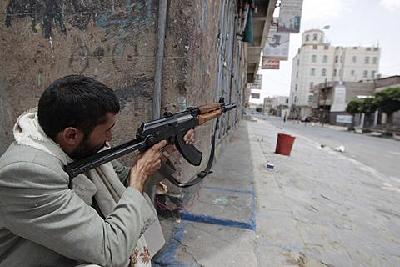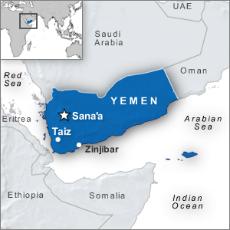Political wrangling is underway in Yemen's capital as President Ali Abdullah Saleh receives treatment in Saudi Arabia. US and Yemeni officials say President Ali Abdullah Saleh suffered injuries far more severe than previously reported in last week's attack on his presidential palace, raising doubts about his return to power - even as fighting in the south killed dozens of people. Elsewhere in the country, fighting continues between government troops and Islamic militants.

Fighting has flared again in Zinjibar as government forces try to retake the southern town they abandoned two weeks ago to Islamic militants. There are reports of at least 25 people killed in the southern city in recent days, just one of several areas of unrest in a nation uncertain of its future after a rocket attack wounded its president. Mr. Saleh is in Saudi Arabia and his exact condition is unclear. The acting president, Vice President Abd al-Rab Mansur Hadi, says Saleh will return to Yemen within days.
In the capital, protesters continued to call for the president to stay away.
In Taiz, south of the capital, there are reports of troops engaging in battles with armed anti-government forces. And Saudi Arabian officials report that two of its border guards were killed when a gunman tried to force his way into Yemen.
There was no immediate indication the incident was related to the political unrest, but it served as a reminder of the region's volatility, and Saudi Arabia's long-standing fear of Yemen's troubles spilling northward.

Yemen's opposition groups are pushing for the interim leaders to accept a Saudi-led proposal to see a transition away from Saleh's nearly 33-year rule. A leading coalition of opponents, the Joint Meeting Parties, has offered to enter into talks on a transition. But government figures, including members of the president's family, say they are awaiting the president's return.
Saleh has repeatedly rejected the Gulf transition plan. Political analysts say the JMP is not an ideal partner for transition talks.
Kate Nevens is a Middle East analyst at London-based Chatham House. "This formal opposition idea is an idea that I think we need to move away from. We do not have a traditional government and a traditional opposition in Yemen. Everyone is involved in these elite patronage networks and in many cases the formal opposition are as corrupt or non-inclusive as the regime," she said.
In addition to regional calls for an inclusive transition, US Secretary of State Hillary Clinton and the European Union's foreign policy chief Catherine Ashton both referred to the "best interests" of the Yemeni people in pushing for change. The Yemeni people are far from a united group, divided as they are by tribal, political, military and Islamist loyalties.
But Abdulaziz Sager, head of the Gulf Research Center in Saudi Arabia, argues the people alone must determine Saleh's future.
"If he goes back, in what capacity, that's up to the Yemeni people to decide - whether they want to receive him as a former president, or they want to receive him as political party member or as a normal citizen, which they will definitely face. It is their right to decide in which capacity they would like to receive him as," said Sager.
But with the situation so volatile, and the stakes - including the threat of a local terror group and the safety of key shipping lanes - so high, foreign nations are unlikely to stand to the side.
patronage: the system by which an important person gives help or a job to somebody in return for their support(掌權者給予提挈以換取支持的)互惠互利
Saleh's return to Yemen challenged
Shaky truce ends with blasts as Yemen edges closer to civil war
New doubts over Yemen power deal
'Al-Qaida' takes south Yemeni city
(來源:VOA 編輯:崔旭燕)
